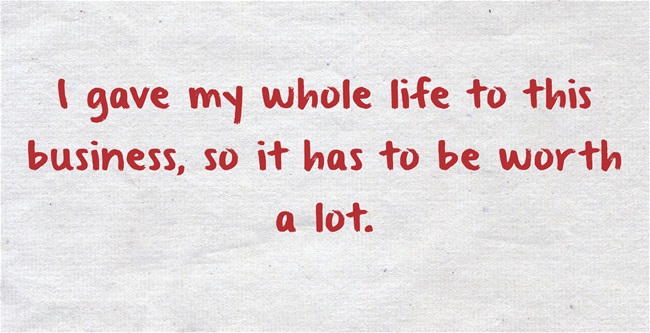Are you an owner who is thinking of selling your business? If so, do you know how to sell your business?
If you are like a lot of owners the answer to the first question is, “Yes, I’m ready to go right now.” and the answer to the second questions is, “Nope, don’t have a clue.” If those are your answers, then you are in the same situation as thousands of other business owners.
That is not good news for them, and it is not good news for you. We are in the middle of the largest selloff of privately owned businesses in our country’s history. Baby boomer owners have started to retire, and they are having an unprecedented impact on the business real estate market. There are too many businesses and not nearly enough buyers. This has created a buyer’s market, which is expected to last 15-20 more years.
So, how can you successfully sell your business? Foremost, use logical thinking and understand that your business is merely a product. Most owners listen to their feelings and significantly overvalue their companies.
They feel,

They are stunned when buyers offer much less than the asking price or more commonly nothing at all. If you are serious about selling your company, you must spend time, money and effort positioning it to look attractive to buyers. As the seller, it is up to you to convince them that your product is better than all the others. You may even have to push back the sale a few years, which will allow you to develop and follow a comprehensive exit strategy.
Use this checklist to figure out if you are ready to sell your business.
Business
- What is your company offering the buyer that is better than the guy down the road? Do you have something of value to sell? What value – facts, not guesses – can you show for your products/services?
- What tangible assets (building, equipment, vehicles, machinery, furniture, contracts, books of business, customer database, etc.) are being sold? Can you show factual, current market values?
- How much of what you are selling are intangible assets and unwritten knowledge (business ideas, strategies, policies, and procedures, customer information, goodwill, handshake agreements, etc.)? Is there a way to make them a tangible asset, with market value?
Personnel
- Are you able to show the buyer the value of your workforce? Do you have metrics for your employee’s productivity, including managers and supervisors? Can you match current performance reviews with up-to-date job descriptions?
- Have you adjusted the workforce to comply with industry standards for personnel? Are there too many employees for the volume? How about nonproductive family members?
- Are you ready to showcase the unique knowledge and skills your staff can offer the buyer?
Financials
- Can you talk intelligently (i.e., profit, cash flow, margins, labor burden, overhead, accounts receivables) about the company’s financial condition and what ROI the buyer can expect? How will you demonstrate he can service the debt in a reasonable time frame – that your company is a “good deal”?
- Do you have clean taxes and books, or should they be fixed? Do they show an accurate, legal value of the company and the income you are claiming?
- Most buyers are looking for a turnkey operation. Do the books show that you have kept up on facilities/equipment management, technological advances, and capital improvements.
It is a difficult time to sell your business, and it is going to be hard for many more years. But, if you develop and implement a good exit strategy, you will be ahead of most of the other owners who are selling their companies, because they will not do the work. Let the other guy go out with a whimper, while you go out with a bang.
At Cogent Analytics, we never stop looking for ways to improve your business and neither should you. So, check out some of our other posts for helpful business information:



